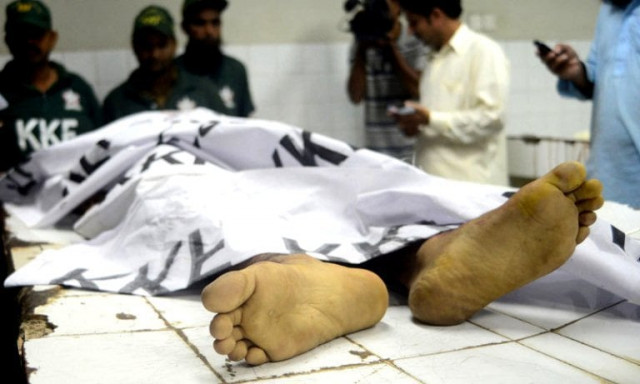Torture alleged: Family protest after robbery suspect dies ‘in custody’
Police, ATH officials say he could have died of kidney failure

Police, ATH officials say he could have died of kidney failure. PHOTO: AFP/FILE
Subsequently, his family blocked the KKH in front of the hospital to stage a protest, demanding that murder cases should be registered against the police officers responsible.
Bashir Ahmed, who originally hails from the Kohistan region before settling in the Shohal Mahzullah village, told the media that his brother, 33-year-old Ghulam Hussain, had been arrested by the local police on February 20. Hussain was considered to be a suspect in a burglary at the house of one of their relatives -Muhammad Miskeen.
Ahmed claimed that while questioning his brother, the investigation staff at Balakot police station subjected Hussain and three other suspects to third-degree torture in a bid to coerce them into confessing to the crime.
He alleged that policemen beat Hussain, Faraz, Alam Khan and Jamil mercilessly. As a result, Hussain and Farzaman suffered multiple fractures in addition to severe injuries to their private parts.
Such was their condition when they were sent to the Mansehra District Jail on judicial remand after their three-day physical remand expired, the jail doctor refused to accept them.
Ahmed said that the jail referred the two men to the King Abdullah Teaching Hospital where the police kept them incommunicado. Ahmed claimed that his brother did not receive proper treatment at the hospital and by Sunday night, his condition had worsened.
Regardless, the police shifted Hussain to the Ayub Teaching Hospital on Sunday evening where he died on Monday. Ahmed accused the doctors of not providing proper medical care to his brother.
When Hussain’s family learnt about his death, they took his body and placed it outside ATH’s main entrance and staged a protest. The protesters blocked the road for traffic for over half an hour, demanding that the investigation officer and other police officials involved in Hussain’s death should be booked for murder since they were responsible for torturing him during custody.
They also accused the ATH administration of negligence in providing emergency treatment to Hussain.
However, ATH spokesperson Shafiq Ahmed said that when Hussain was brought to the ATH on Sunday evening, his kidneys were not properly functioning.
The ATH official stated that Hussain was provided with the required treatment and senior doctors had recommended his dialysis on Monday morning, but he died before then. Doctors said the man died of renal failure.
The official denied that Hussain was brought in as a medico-legal case or under police custody.
Meanwhile, Investigation Officer Ali Akbar told The Express Tribune that around 10 robbers had barged into Miskeen’s home and took away cash, jewellery and other valuables worth thousands on December 26. During investigations, mobile data of all the suspects proved the involvement of Hussain, Farzman, Alam, Jamil and six others. They were arrested on February 21 and had obtained a four-day remand on February 22.
The officer added that the men had confessed to their crimes on during interrogation and had helped recover the 31.25 grammes of jewellery and Rs89,000 in cash. “The suspects were physically fit and walked to the office of the medical officer for medical examination, walked on foot to the court of the judicial magistrate which shows they were not tortured,” Akbar claimed, adding that doctors did not note torture in their post-remand report either.
Pointing towards the statement of ATH officials he said that Hussain may have died from medical complications since his family had said that he was a kidney patient.
Published in The Express Tribune, March 7th, 2017.



















COMMENTS
Comments are moderated and generally will be posted if they are on-topic and not abusive.
For more information, please see our Comments FAQ